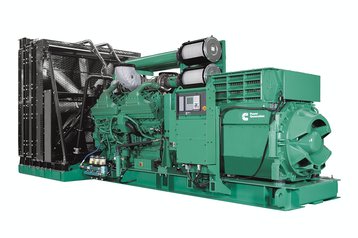If national grids are struggling, it looks as if data centers could be asked help provide the shortfall. The UK is facing a possible gap in its generating capacity and gas and electricity provider British Gas is inviting data centers to help.
The UK has a lot of ageing fossil fuel generation - around 20 percent of its capacity, which great for baseline power production, but those generators will have to be switched off as they age, and because they don’t meet the emissions plans set out by thye government.
Although the UK now has a substantial amount of renewable energy, the country hasn’t moved as fast to green sources as it was hoped, and in any case renewables are intermittent. So Britain faces the possibility of shortfalls in power capacity at times when demand is high and produciton is low.
A powerful proposal?
British Gas’ parent Centrica has a proposal to help with this. The plan is called Distributed Energy, and essentially it would allow the National Grid to request power from its customers at peak times. Data centers and other industrial sites have backup diesels sitting idle most of the time. Centrica believes they could be made available to feed energy into the grid, averting the need to build new generation capacity.
Russell Park, head of energy and sustainability solutions at British Gas, outlined the proposals at the Datacentre Summit London conference last week, whereit was reported by Computer Weekly. The company previously described the idea on the here on the DCD site and outlined it at DCD Zettastructure in November 2016.
Park says a telecoms company and a colocation provider are already trying the scheme out.
It’s not a unique idea. The UK has operated a scheme called “demand response” for some time, and elsewhere, Microsoft has offered power from its datacenter diesels in Cheyenne.
And uphill struggle
The scheme may face an uphill struggle from most data center operators. Those backup power supplies need to be available for emergencies, they told me at the Zettastructure event last year. And if the grid is under strain, that is the time when the diesels are most likely to be needed by the data center.
Data centers and other industrial sites have backup diesels sitting idle most of the time. Centrica believes they could be made available to feed energy into the grid
There’s another potential drawback. These diesels will create pollution and greenhouse gases if they are used extensively, as well as noise. And many data centers are in or near urban areas.
However, Centrica points out that generating power locally actually reduces the amount of energy that needs to be produced - because it cuts the losses in the transmission network. Centrica says a company moving to this model could cut its overall carbon footprint.
And there’s an obvious incentive: there’s actual money to be made here, and operators are looking for the most cost effective way to power their sites. Centrica believes companies can save up to 15 percent through energy efficiency, and up to 20 percent by generating their own power.
This may still be too strange an idea for many data centers, but I think it will become increasingly commonplace.
A version of this story appeared on Green Data Center News


